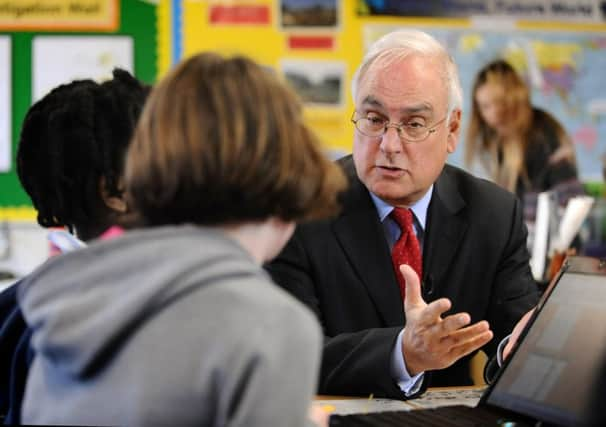Ofsted warn early stages of secondary school are being overlooked


A report by the regulator found the progress made during Key Stage 3, which normally covers years 7 to 9 when pupils are aged between 11 and 14, is often slow - particularly in English and maths.
It said teaching too often fails to build on the gains pupils have made in primary school, it said, with both the leadership and education during this period often a cause for concern.
Advertisement
Hide AdAdvertisement
Hide AdHead of Ofsted Sir Michael Wilshaw said: “Today’s report demonstrates that too many secondary schools do not give provision at Key Stage 3 the priority it deserves.”
It suggested that school leaders treat Key Stage 3 as the poor relation of Key Stages 4 and 5, and as a result the deployment of staff and resources is too often skewed towards the upper age ranges.
One in five inspection reports identified Key Stage 3 as an area for improvement. The report used evidence from more than 1,900 inspections, interviews with 100 school leaders and almost 11,000 questionnaire responses from pupils.
It said teachers are not consistently building on pupils’ prior knowledge and skills. Ofsted also found the quality of homework in Key Stage 3 is too variable and does not effectively enable pupils to consolidate or extend their learning.
Advertisement
Hide AdAdvertisement
Hide AdInspectors also concluded that teaching in modern foreign languages, history and geography at Key Stage 3 often fails to challenge and engage pupils, which impacts on the take-up of these subjects at GCSE.
Sir Michael added: “Inspectors have found that pupils often leave primary school with good literacy and numeracy skills, confident and eager to learn, but their progress then stalls when they start secondary school.
“The importance of a good start to secondary school education cannot be overstated.
“School leaders need to have a clear understanding of their pupils’ achievements in primary school and build on them effectively from the day they start secondary school life.”
Advertisement
Hide AdAdvertisement
Hide AdThe report has attracted some criticism from teaching union leader who suggested Ofsted carry some of the blame for schools focusing on GCSEs.
Christine Blower, General Secretary of the National Union of Teachers, said:“Ofsted decided to scrap its previous inspection framework, admitting in January 2015 that ‘reliability’ was a problem. Ofsted also decided not to renew the contracts of 1,200 of its inspectors. Yet it is on the basis of school inspection reports drawn up under this unreliable framework, many written by the inspectors who were not retained, that Ofsted is now drawing conclusions in this provocative report.
“We have a school system that holds schools accountable for what their students achieve through high stakes testing at 11, and at 16. These are the sharpest pressure points. It is no surprise that schools come under pressure to focus on Key Stage 4. Indeed, it is high time that the Department for Education and Ofsted recognise that it is their own accountability agenda which causes schools to focus on high stakes tests and league tables.”
Russell Hobby, general secretary of school leaders’ union NAHT said: “We know that this stage is crucial in the development of pupils, not least in ensuring a smooth transition from primary to secondary education.
Advertisement
Hide AdAdvertisement
Hide Ad“School leaders continually work hard to make sure that pupils are supported at the start of secondary education, whilst receiving teaching that stretches, supports and develops.
“The danger is that the high stakes accountability applied to GCSEs and A levels, along with constant tinkering by government, distracts attention from Key Stage 3. It is hard to find the specialist staff to teach this age group, for example, when you are also transforming your GCSE offer and facing a recruitment crisis at the same time. This shortens school leaders’ horizons and forces them to focus on the short term.
“Too often in the past, Ofsted has focused on the current year’s exam results rather than investments in areas like Key Stage 3 which would only show up in years to come. The situation is partly of their own making and we are therefore glad they are changing their focus in the new framework to better reward this sort of development.